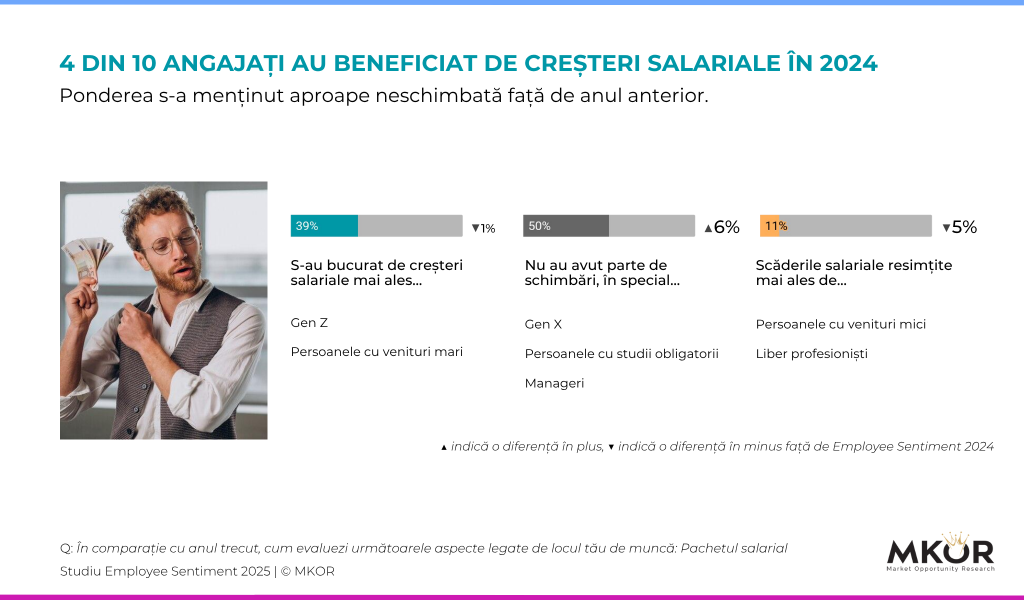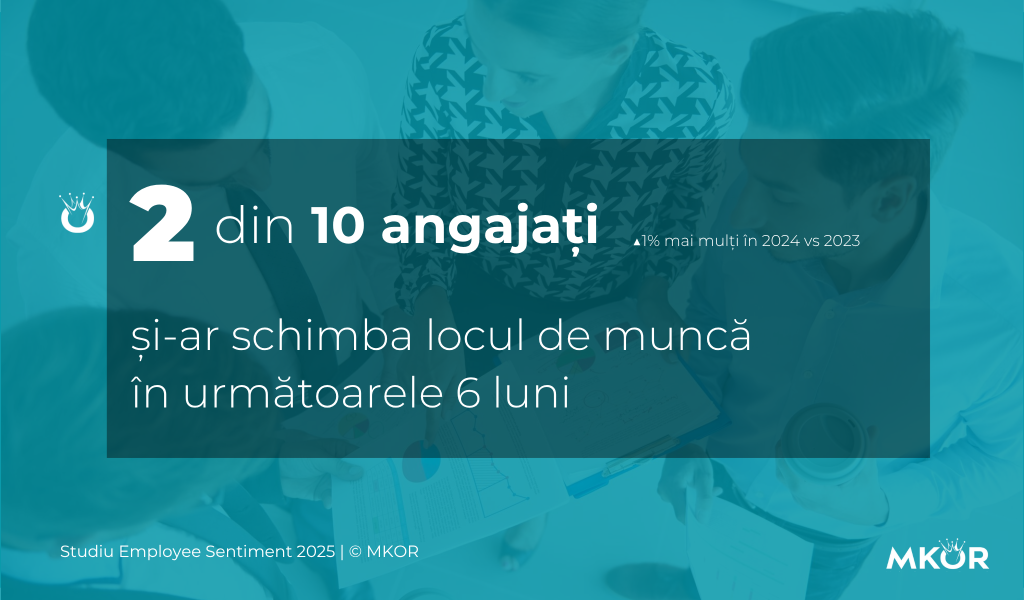Employee Sentiment 2025 delivers an in-depth snapshot of employees in Romania, against a tense, uncertain economic backdrop.
4 in 10 employees received a pay raise in 2024. The rest got only extra work. As a result, stagnant salaries, lack of recognition, and limited opportunities for professional development fuel a clear desire for change, 7 in 10 Romanians would leave their current job for a better financial offer.
The study captures differences between generations, the personal priorities that shape professional decisions, and perceptions of security, flexibility, effort, and reward.
Access: Download the Research Report "Employee Sentiment - What plans do employees have" – and discover the results of our study
Only 4 in 10 employees received a pay raise in 2024. The rest got more work
For many employees in Romania, 2024 brought a mix of stability and mounting pressure. While most did not see major changes to their work arrangements, workloads and organizational expectations continued to increase.
70% of employees said their work setup was just as flexible as in the previous year, indicating continuity in remote-work or flexible-schedule policies.
Only 39% of respondents benefited from salary increases, and 22% received expanded benefits, a sign that, although some organizations invested in retention, most employees did not feel a meaningful improvement in their compensation package.
Likewise, only 26% of employees had access to professional development opportunities such as trainings, promotions, or new projects.
When it comes to job security, perceptions are mixed. 18% of employees said they feel more secure than last year, especially younger people (Gen Z) and those with higher incomes.
However, the same share (18%) felt a drop in stability, particularly among Gen X and lower-income employees. The majority (64%) perceived no significant change.
54% of employees experienced an increased workload in 2024 versus the previous year, especially Gen X, higher-income employees, and those in management roles.
This added pressure comes as team structures remained relatively unchanged: only 21% say teams grew in size, while 25% say they shrank. Many employees therefore face greater responsibility and more tasks without the extra support of new colleagues.
Different generations, different priorities: what makes Romanians stay or leave a job?
For many employees, 2025 comes with a desire for change. Two in ten Romanians say they intend to change jobs in the next six months. The main driver remains financial: 7 in 10 employees would leave their current job for higher pay.
Other important reasons include access to extra-salary benefits (31%) more relevant for those with middle incomes and people in rural areas and the desire for a safer job (31%), especially among people over 44, those with low incomes, or managers.
For Gen Z, stability matters less than flexibility and career prospects. They value the possibility of hybrid work and advancement opportunities, signaling a shift in priorities compared with earlier generations.
For half of Romanians, covering basic expenses is the main concern regarding their personal situation, making financial aspects the strongest motivator in career decisions.
Salary level is cited as the second-largest source of concern (40%), followed by physical health (37%), indicating a context in which financial stability becomes essential for overall life balance. These concerns influence both motivation at work and the willingness to seek better-paid opportunities.
Access: Download the Research Report "Employee Sentiment - What plans do employees have" – and discover the results of our study
On the other hand, 56% of respondents say they do not plan a professional change in the near future. They are generally men over 44, employed in technical or operational fields, with monthly incomes between 3,000 and 6,000 lei. Many of them enjoyed some stability in 2024: they kept the same flexible work arrangement, retained their team, and some received pay raises or professional development opportunities.
Gen Z stands out for its drive to increase earnings either by renegotiating their current salary or through additional activities. Half say they will look for alternative income sources such as a second job, freelancing, or extra work.
At the other end are the most dissatisfied employees: 24% say they are very likely to change jobs. These are mainly Millennials and people with middle incomes who, in 2024, faced an unstable workplace atmosphere, lack of support for development, and low team morale.
Rising pessimism: 3 in 10 employees expect a more unstable job market
Overall, employees show moderate pessimism about labor-market prospects. Employees are more pessimistic than managers about how the unemployment rate will evolve this year.
The Employee Sentiment 2025 study outlines a tense professional climate marked by stagnation, pressure, and dissatisfaction. For most employees, 2024 meant more work without proportional compensation: only 4 in 10 received a pay increase, and meaningful professional development opportunities were accessible to less than a quarter of respondents.
Despite promises around flexibility or employee well-being, the reality inside companies remains unbalanced: teams haven’t grown, workloads have intensified, and morale is fragile.
The desire for change hangs tangibly over the labor market, not just as an intention, but as a natural reaction to a context in which employees feel they give more than they receive. In this climate of uncertainty and pressure, salary becomes not only a motivator, but a criterion for staying afloat.
Access: Download the Research Report "Employee Sentiment - What plans do employees have" – and discover the results of our study
Research details:
The results are drawn from MKOR’s Employee Sentiment and Consumer Sentiment studies.
- Sample size:
- N respondents Employee Sentiment=1000
- N respondents Consumer Sentiment=1000
- Sample characteristics: nationally representative by gender, age, and geographic distribution
- Target: general Romanian population aged 18–55
- Research method: opinion survey (CAWI)
- Instrument: questionnaire
- Approach: online, via the MKOR Consumer Panel
MKOR supports your market-research process with current, #DatePeBune insights on Romania’s market and business dynamics. We analyze customer perceptions, consumer behaviors, and competitive activity, so you get relevant data to make informed decisions and optimize your business strategy.
We invite you to visit the Services section to learn more about the studies we conduct. In our portfolio you’ll find case studies from collaborations across industries, as well as proprietary studies conducted by our team.
Contact us to discover how market data can support your business growth and give you a competitive edge in the Romanian market.
Have you read everything? Comment / join our newsletter / read our other research posts!
Impact and Innovation in Research at MKOR in 2024: A Retrospective
January 27, 2025
0 Comments29 Minutes
Employee Sentiment Study: What Plans and Expectations Do Employees Have in 2024?
April 8, 2024
0 Comments16 Minutes
Employee Sentiment 2023: Key Insights into Romania’s Labor Market
November 18, 2024
0 Comments5 Minutes











